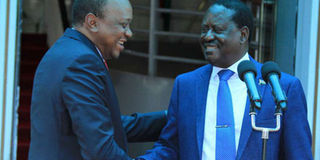The Building Bridges Initiative: A Critique

President Uhuru Kenyatta (left) and Opposition leader Raila Odinga conclude a joint press conference on March 9, 2018 at Harambee House, Nairobi, where they agreed to promote lasting national peace. PHOTO | FILE | NATION MEDIA GROUP
What you need to know:
- Uhuru and Raila decided their new friendship needed to be lorded upon Kenyans, morphing it from being an arrangement between two individuals into a supposed national project, funded by taxpayers.
- As long as Uhuru and Raila refuse to demystify the handshake and continue speaking in coded language then it’s unrealistic to expect the initiative to yield anything meaningful.
On the passing of Russia’s Permanent Representative to the United Nations, Vitaly Churkin, his US counterpart Samantha Power wrote him a deeply moving tribute, calling him "one of the world’s most effective diplomats".
Power volunteered that of all UN diplomats, it was only Mr Churkin and his wife Irina who she had ever invited to her parents’ home for Thanksgiving, showing that theirs wasn’t only a highly professional relationship, but also an authentically personal one.
This revelation came as a surprise to many, courtesy of the supposition that since Russia and the US are perpetual antagonists, then their respective UN ambassadors wouldn’t enjoy such good relations.
Yet on assuming office, Ms Power recalled her predecessor Susan Rice instructing her that if she wanted to make her work easy in pushing US interests at the UN, she had to befriend the Russian from word go.
PRIVATE RELATIONSHIP
Their unique friendship notwithstanding, Ms Power divulged that she and Mr Churkin still had huge disagreements on the floor of the UN, in staying true to their roles.
A similar camaraderie was enjoyed between Barack Obama and his 2008 Republican opponent, Mr John McCain, who seeing that he was progressively succumbing to cancer, asked Mr Obama to eulogise him at the time of his passing.
Mr Obama agreed to Mr McCain’s wish. Speaking at his memorial service, Mr Obama revealed that he and Mr McCain had maintained a private relationship, where the Senator visited the Oval Office from time to time, holding unpublicised conversations with Mr Obama, in which they sometimes deeply disagreed, yet remained fully aware that they each represented something truly American. This too was a somewhat unexpected friendship.
It wouldn’t be completely far-fetched to look at the previous political hostility between President Uhuru Kenyatta and Opposition leader Raila Odinga, at least since their 2013 presidential contest, akin to the electoral rivalry between Obama and McCain — to put it mildly — or if they were countries — to put it in its proper context of extremities — Russia and the US.
BROMANCE
Yet like Obama and McCain, or Power and Churkin, the two leaders must have known that their bruising political battles were not personal, and that in fact there was room for personal relationships.
It is however a little difficult to imagine Uhuru and Raila enjoying a sincere personal relationship between them post 2013, seeing how brutal and sometimes below the belt their attacks on each other were.
Then March 9 happened, and everything changed. From the chemistry between them to their endearing lexicon when speaking about each other, it was evident that Uhuru and Raila were indeed brothers, born again in the religious sense — the old gone, the new ushered in.
Unlike the 2013 UhuRuto bromance — as Millennials refer to brotherly affection — which seemed choreographed by a public relations firm, coming complete with matching shirts, ties and the Obama inspired folded sleeves, the recent Uhuru-Raila PDA (Public Display of Affection) has something surprisingly genuine about it, albeit motivated by something strange, something only the two men and those in their innermost sanctums are aware of. And herein lies the problem.
NATIONAL PROJECT
As Obama and McCain nurtured their friendship, and as Power and Churkin had their private dinners, it was never lost on them that they each represented something bigger, which could not be overshadowed by their personal relationships, no matter how cosy they got.
These rare friendships, it seemed, were meant to ensure those involved pursued their respective mandates as originally fashioned, but with the benefit of the new found cordiality, they would now do so with a sense of courtesy and respect for each other, since they belonged to opposing camps.
It would seem that on March 9, Uhuru and Raila finally had their Power-Churkin private dinner or Obama-McCain confidential Oval Office moment, where they decided that indeed a genuine personal friendship was possible.
However, Uhuru and Raila did something uncharacteristic.
Unlike Power and Churkin or Obama and McCain, Uhuru and Raila decided their new friendship needed to be lorded upon Kenyans, morphing it from being an arrangement between two individuals into a supposed national project, funded by taxpayers.
NATIONAL DIALOGUE
To the two principals, the friendship needed to yield national implications, and in attempting to rationalise their mission, they released a tersely worded communiqué, invoking the spirits of their respective fathers.
This original Uhuru-Raila sin, of narrowing things down and framing the narrative of Kenya’s political challenges partly into the historical tag of war between their fathers, Jomo Kenyatta and Jaramogi Oginga Odinga, then presenting the friendship between the two sons as some sort of first step towards developing an antidote, seems to either suggest a lack of imagination on their part — even if the friendship can indeed have deeper meaning — or an indicting admission that in fact the two families control Kenyan politics.
Of course there is no downplaying the Kenyatta-Odinga rivalry and its repercussions, but it would be a no-brainer to appreciate that inclusivity needed to be done and be seen to be done from the word go — in expanding national dialogue beyond the Kenyatta-Odinga axis — for the country to embrace it.
2022 ELECTIONS
The current architecture of the Building Bridges Initiative remains limited to the personal whims of Uhuru and Raila, with their private dinner conversations still remaining secret.
As such, the project feels like a mouse trap which Kenyans are being asked to walk into, after which they don’t know what the two principals will decide to do once they have the country at the place they want to get it to.
If this were not the case, one wonders why Uhuru and Raila remain cagey about the details of their conversations, resulting in en mass conclusions that it all boils down to 2022 and their two families. This in turn takes air out of the initiative, leaving it stillborn.
However, since the country is footing the bill for the exercise, it will not be asking for too much to demand for less opacity from Uhuru and Raila.
TRANSPARENCY
In Kiswahili, we say afichae uchi hazai. As long as Uhuru and Raila refuse to demystify the handshake and continue speaking in coded language — an equivalence of them refusing to expose their nakedness — then it’s unrealistic to expect the initiative to yield anything meaningful.
Inviting the public to submit memoranda when there is continued suspicion as to the real and perceived motives behind the project will similarly attract a half-hearted sort of engagement, resulting in a spectacularly lost opportunity.
Alternatively, Uhuru and Raila can be advised to keep their friendship — like Power and Churkin at the UN or Obama and McCain at the Oval Office — completely private.
Mr Amuke is a writer and journalist




